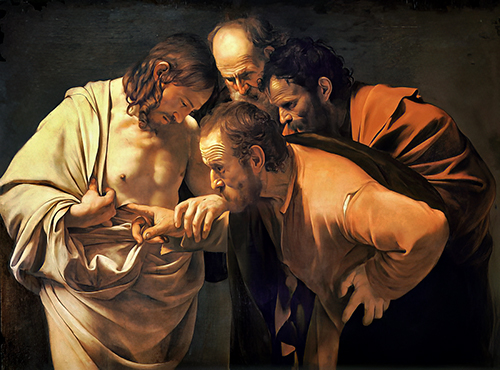
Our Gospel for this Sunday (John 20: 19 -31) is remembered as the story of doubting Thomas — this in spite of the fact that Thomas makes the most resounding act of faith in Jesus in the whole Gospel of John. It should really be remembered as a story of faith — believing Thomas. But that will never catch on, simply because we identify more readily with the figure of doubt — just that bit nearer to our experience.
There is a painting by the celebrated 17th century Italian artist, Caravaggio which is titled “The Incredulity of St Thomas”. The painting was completed between 1601-1602. It is the most copied painting of Caravaggio, 22 copies from the 17th century are known. The painting represents visually what we have proclaimed in today’s Gospel, namely the invitation by Jesus to Thomas to “put your finger here and see.” In Caravaggio’s painting Thomas has the forefinger of his right hand inserted into the side of Jesus as far as the first knuckle joint! It is a dramatic presentation of today’s Gospel and invites a reflection on touch.
Touch speaks the wordless words of love and intimacy. We receive so much touch when we are babies and so little when we are adults. Our Holy Thursday liturgy has individuals touching another’s feet in the intimacy of foot washing. At the Good Friday liturgy, we are invited to venerate the Cross, and many come forward to touch the wood with hand or lips. Each time we gather to receive Holy Communion, we hold our hand and are touched with the Body of Christ.
And then standing in a crowded bus or train bodies jostle back and forward and touch with the movement of the vehicle.
Being human people, we are embodied, enfleshed, as Jesus was when “the Word became flesh and dwelt among us”. ( Jn 1: 14)
Touch has a vocabulary of its own. In friendship touch often gives more life than words. A friend’s hand stroking our back, a friend’s arms resting on our shoulder, a friend’s fingers wiping our tears away, a friend’s lips kissing our forehead — these are true consolation. Two lovers speaking their love through the intimate touch of the other’s body.
These moments of touch are truly sacred. They restore, they reconcile, they reassure, they forgive, they heal.
John’s Gospel tells of a deep personal peace that comes when we are freed from fear and confusion. Jesus indicates this freedom as he asks Thomas to feel his wounds, dissolving Thomas’ fear and distrust by letting himself be touched so intimately.
Everyone who touched Jesus and everyone whom Jesus touched were healed. God’s love and power went out from him (see Luke 6:19). When a friend touches us with free, non-possessive love, God’s incarnate love touches us and God’s power heals us.
The illustration is of “The Incredulity of Saint Thomas”, 1601 – 02 , currently in the permanent collection of Sanssouci Picture Gallery, Potsdam, Germany.



